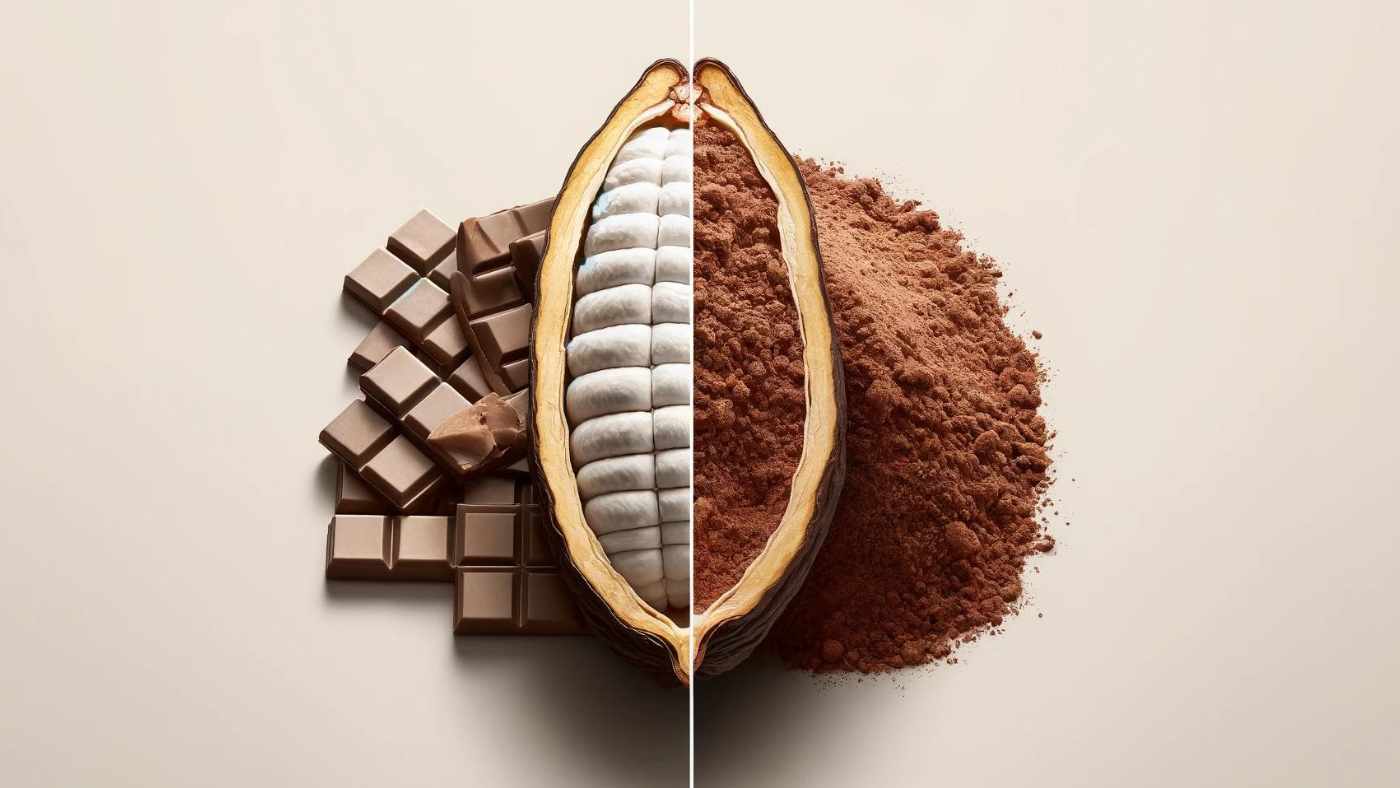Cacao Powder vs. Cocoa Powder (Exploring the Difference)

Navigating the health food aisle can sometimes be perplexing, especially when deciding between cacao and cocoa powder.
Although they may seem similar, their histories, processing methods, and nutritional benefits differ significantly, offering unique culinary experiences.
In this comprehensive guide, we will examine the differences to help you make an informed decision about your next culinary adventure. Wild Foods, an expert in sourcing naturally and minimally processed products, is here to help you make this delicious decision.
Key Takeaways- Processing: Cacao powder comes from cold-pressed, unroasted beans, retaining more nutrients, while cocoa powder is made from roasted beans, which can lose some nutrients.
- Flavor: Cacao has a robust, dark chocolate flavor ideal for health bars or smoothies, while cocoa is softer and better suited to cakes or hot chocolate.
- Health: Both powders contain caffeine and fat. Raw cacao might cost more due to its less processed nature and higher nutrient content.
- Usage: Choose based on your desired taste and health benefits.

Understanding Cacao vs. Cocoa
Cacao is derived from cacao trees grown in warm regions. The beans, collected from cacao pods, are the starting point for all chocolate products.
Cacao is typically used to describe raw, unroasted beans, whereas "cocoa" refers to roasted beans.
Heating impacts taste, color, and nutrient retention, with cacao preserving more natural goodness due to minimal heat exposure. This makes cacao a favorite in health food stores and among those seeking extra nutrition in their meals and smoothies.
Processing Techniques
- Cacao Powder: This powder comes from cold-pressed, unroasted cacao beans, which maintain natural enzymes and remove fat (cacao butter) (1).
- Cocoa Powder: Made with high-temperature roasted beans, which reduces enzyme content and improves general health. Some cocoa powders are processed with an alkaline solution (Dutching) to remove bitterness, which results in a milder flavor but fewer nutrients.
Nutritional Showdown: Cacao vs. Cocoa
| Nutrients | Cacao Powder | Cocoa Powder |
|---|---|---|
| Antioxidants | Higher due to minimal processing | Lower because of high-temperature processing |
| Minerals | Rich in magnesium, iron, potassium, and calcium | Contains minerals but in slightly reduced amounts |
| Fiber | Naturally high in fiber | Fiber content is reduced due to processing |
| Flavonoids | Abundant, contributing to health benefits | Present but less potent |
| Fat Content | Higher in healthy fats as cocoa butter remains | Lower fat content due to cocoa butter removal |
| Calories | Calories may be higher due to fat content | Slightly fewer calories owing to less fat |

Health Benefits and Risks
Cacao powder is rich in healthy compounds like magnesium and antioxidants, supporting heart and brain health. It may enhance mood and blood flow while lowering blood pressure.
Cocoa powder still offers benefits but to a lesser extent due to higher processing temperatures (2).
Both powders contain caffeine, affecting sleep and relaxation if consumed excessively (3). They also carry saturated fat, so moderation is vital to maintaining a healthy diet.
Taste and Culinary Applications: When to Use Cacao or Cocoa
- Cacao Powder: Intense, earthy flavor ideal for health bars, smoothies, or as a topping on granola.
- Cocoa Powder: Familiar chocolate tastes perfect for cakes, brownies, and hot chocolate.
Best Uses in Baking and Cooking
- Rich, dark flavor in brownies
- Nutrient boost in health bars or energy bites
- Chocolatey twist in smoothies
- Sprinkled over oatmeal or muesli
- Adds depth to sauces and gravies
- Classic chocolate goodness in cookies and cakes
- Dutch-process cocoa for recipes requiring baking powder
- Black cocoa for an Oreo-like taste in baked treats
Related Studies:
- This study compares the nutritional profiles of cold-pressed cacao powder and high-temperature processed cocoa powder, highlighting differences in flavonoid content and antioxidant activity.
- This study highlights the significant amounts of magnesium and antioxidants in cacao powder, emphasizing its potential health benefits.
- This systematic review and meta-analysis investigate the effects of cocoa consumption on blood pressure, including the potential benefits of cacao powder on blood flow and mood.
To Wrap It Up
Understanding the differences between cacao and cocoa powders empowers you to choose the best fit for your culinary creations. Choose cacao powder for its nutrient-dense profile and robust flavor and cocoa powder for a classic, comforting chocolate taste.
Each has a purpose in your kitchen, whether you are baking, blending, or brewing. Wild Foods' chocolate products, including Wild Cocoa Powder, provide an authentic experience of excellence and purity.
These items have been carefully developed to complement your health-conscious lifestyle and culinary excursions, allowing you to experience the rich world of chocolate fully.
FAQs
1. What's the main difference between cacao powder and cocoa powder?
Cacao powder comes from cold-pressed, unroasted beans, keeping more health benefits, while cocoa powder comes from beans roasted at high temperatures, altering taste and reducing nutrients
2. Can I use cacao and cocoa powders to make chocolate chip cookies?
Yes, but cacao might taste more bitter than sweetened or Dutched cocoa.
3. Why is cacao powder considered better for you?
It retains more minerals, such as magnesium, chromium, zinc, and selenium, and it's made with low-temperature processing, preserving its nutritional value.
4. What are fermented cacao beans used for?
Fermented beans are dried and typically processed into cocoa nibs or liquor necessary for chocolate production.
5. How can I know if my drink contains natural nutrients from the cacao tree?
Check the nutrition labels for "cocoa mass," "cocoa nib," or "cocoa content."
